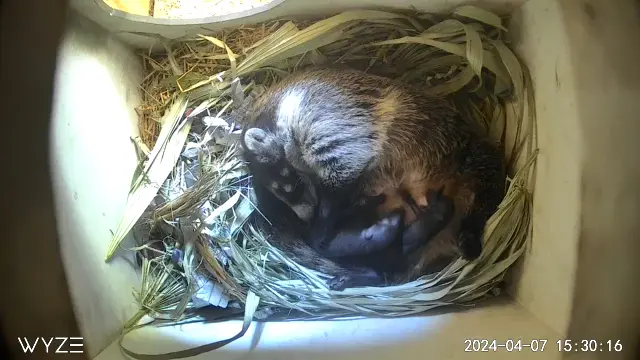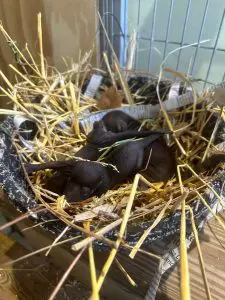

Welcome, little ones!
We’re excited to share that our Zoo is now home to the first white-nosed coati births in about 7 years in a North American facility accredited by the Association of Zoos and Aquariums (AZA)!
Earlier this month, we shared that coatis Sky and Rita were pregnant and had moved to behind-the-scenes habitats to give birth to their kits with minimal disturbance. The two are now young mothers!

Sky’s babies!
Sky gave birth to three kits – a male and two females over April 1-4. Rita has given birth to five kits – two males and three females over April 6-8! Our animal care team has learned so much throughout this process, including that coatis can give birth to multiple babies over a series of days.
Although we’re guardedly optimistic during these early days, everyone appears overall healthy thanks to the care from their two young moms and their animal care teams. With such big litters, our keepers are closely monitoring all the kits’ weights to ensure everyone is receiving proper nutrition.
Our Zoo’s animal care team has put in a lot of work to begin building back a genetically diverse, healthy safeguard population of this species in AZA-accredited zoos. Starting in 2021, we renovated and expanded our white-nosed coati habitats to support a larger band and brought in five young coatis to our Zoo. Learning from the natural history of this species, we also changed the way we’re caring for our coati by establishing a larger female band with their own space and a male who keeps his own territory until it’s breeding season. We’re looking forward to sharing all we’ve learned about coati husbandry – not to mention coati pregnancy, labor and birth – with other zoos.
Leading up to the births, our animal care team monitored Sky and Rita in their behind-the-scenes spaces using cameras placed in their nestboxes. This helped them learn the signs of labor and gave them a view of what the early days of coati life include.
“Mom spends most of her time in the nest nursing and grooming babies,” said director of animal programs Lauren Hinson. “She only leaves to eat quick and use the bathroom, but she comes right back when they cry. Babies are just nursing all the time.”
Sky has taken to being a mother well, building a beautiful nest early on. She has been very attentive and gentle with her three babies, said Lauren.
Rita initially had a tougher time, starting with a breech birth with her first kit. She’s since settled into being a mom to five babies, letting them all nurse and being attentive to grooming them.
Our animal care team was hands-off for the first few days. They moved the moms to a separate space for food and to get quick weights on the kits. Lauren is now hand raising a larger kit to ensure his much smaller sister has a chance to gain more weight. We hope this is a temporary solution.
“We have to make sure all babies are getting nursing opportunities and that the moms are calm,” Lauren said.
Once the kits are about two weeks old, they’ll receive an exam by our veterinary staff.
For now, the kits will stay in their behind-the-scenes habitat to continue growing and bonding with their moms. Depending on everyone’s comfort, they’ll stay in those spaces for a few more weeks before being introduced to our larger coati habitat (and new habitat mates, Romi and Agave) in our Rainforest Revealed loop.
Special thanks to Flammio Financial Group, Stifel-Garvin Wealth Management Group, Artemis IT, and Jim and Darleen Barfield. Their generosity makes our work possible!
Brevard Zoo is an independent, not-for-profit organization that receives no recurring government funding for our operating costs. Your generous support enables us to continue to serve our community and continue our vital animal wellness, education and conservation programs.